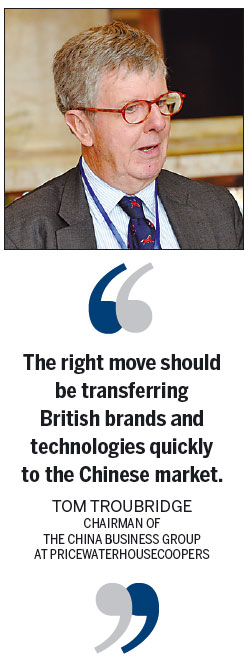Bringing home the best of Britain


PricewaterhouseCoopers executive says Chinese investors should take their acquisitions of UK brands back to China to maximize on gains
Tom Troubridge, chairman of the China Business Group at PricewaterhouseCoopers, says Chinese investors looking for acquisitions in the United Kingdom will get more bang for their buck if they promote their newly purchased British brands in the Chinese market.
"The right move should be transferring British brands and technologies quickly to the Chinese market, so investors can maximize their gains," he says. "Chinese investors are not going to manage the British company as well as the British can, while British companies won't do too well without Chinese partners in China."
Case in point: Earlier this year, Hongyi Capital, a private equity fund in China, acquired British food brand Pizza Express.
"Their plan is not to develop the business in UK as there won't be big growth; but if Hongyi can help Pizza Express gain a presence in every city in China, that would be a massive growth," Troubridge says.
Over the past five years, the UK has seen a dramatic rise in Chinese investment, from being the 21st-largest investment destination for China in 2010 to being its fourth largest this year.
Since 2009, after the meltdown in the global economy, there have been significant changes in the UK's investment landscape, Troubridge says.
"Five years ago, Chinese state companies came to acquire British oil companies, and we saw other state companies, such as Chinese banks, set up offices in London. But in the last two to three years, we are seeing more Chinese private enterprises, such as Dalian Wanda," which purchased luxury yacht company Sunseeker in 2013.
"They are also investing 700 million pounds in a hotel project south of London. We are also seeing Asia business parks in Royal Albert Dock investing 1 billion pounds to develop an industry park for Chinese and Asian companies. There is a similar initiative at Manchester airport."
In 2012, Bright Food Group Co, China's second-largest food company, headquartered in Shanghai, agreed to buy a 60 percent stake in British cereal-maker Weetabix Ltd. Troubridge reiterates that the right plan is to roll the Weetabix brand out in the Chinese market.
He says Chinese investors are currently drawn to the British industries of retailing, consumer products, food and beverage, and healthcare.
"China is beginning to face a rapidly aging population and the UK already has a great deal of experience in elderly care, which is not only about drugs, but the whole system, which includes training nurses and creating high quality care homes."
In the UK, the National Health Service covers 100 percent of the population at an annual federal cost of 8 percent of GDP.
And although there are vast differences in each nation's healthcare system, Troubridge says China can learn from the UK's proven partnership between its private and public medical sectors.
"We have doctors trained in public hospitals, and then they work part time in private hospitals. China is going to develop a private medical system, and the private and public should develop together, rather than one replacing the other."
He explains that UK hospitals can help Chinese counterparts learn to create a better management system, such as recruiting staff and training doctors.
"Typically it takes three to seven years to develop a hospital from the design phase to the full commission," he says. "China is developing its own brands, but in the meantime, they need advanced technologies and management systems from developed countries. In the next five to 10 years, there are opportunities for China and UK companies to work together."
Troubridge, in evaluating trade rows, especially in sectors such as solar panels, steel and wine, that have hampered China-EU trade ties, says more investments in Europe can help to revolve conflicts.
"In recent years, Europe has been going through a bad recession, and is still not out of trouble, so the European Trade Commission has issued numerous anti-dumping probes of Chinese companies. But with more Chinese investments in UK, the easier it will be to resolve trade conflicts because the Chinese government will have investments as leverage in negotiations."
There are other sectors that Chinese investors are highly attracted to in the UK, namely banking, insurance services, agriculture, education and automobile parts.
"UK is a traditional financial center and the forefront of the engineering sector," Troubridge says. "HSBC and Barclay's are based in the UK, and automobiles and parts are the No. 1 export of UK, such as Jaguar, Land Rover, Rolls-Royce and the Mini Cooper.
"Education is another important sector. Over 100,000 Chinese students are studying in the UK, and some of the British schools have begun opening campuses in China, such as the University of Nottingham in Ningbo, Zhejiang province."
The influx of investment can also benefit consultancies like PwC, Troubridge says.
"Traditionally, Chinese companies don't like to pay for consultancy - they don't see the value of it. But when something goes wrong, they end up losing more."
He says revenues from PwC's auditing business make for a third of total global revenue. Its auditing services in China, however, make up three-fourths of revenue in the country.
He recalled that when he joined the firm 30 years ago in Europe, the market was very small, just like the situation in China.
"Professional consulting services are still in the very early stages in China," he says. "But the services will take off with more Chinese companies investing globally. In 20 years, there will be big consulting market in China."
wangchao@chiandaily.com.cn
(China Daily European Weekly 11/14/2014 page15)
Today's Top News
- Japan tempting fate if it interferes in the situation of Taiwan Strait
- Stable trade ties benefit China, US
- Experts advocate increasing scope of BRI to include soft power sectors
- New engine powers cargo drone expansion
- China to boost green industry cooperation
- Manufacturing PMI rises in November






























